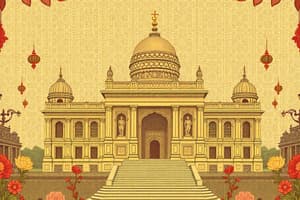Podcast
Questions and Answers
What was the tenure of the upper house known as the Council of States?
What was the tenure of the upper house known as the Council of States?
- 4 years
- 6 years
- 5 years
- 3 years (correct)
Which list divided the powers between the centre and provinces according to the Indian Constitution?
Which list divided the powers between the centre and provinces according to the Indian Constitution?
- Union list
- Concurrent list (correct)
- Regional list
- State list
How many members represented British India in the Federal Assembly's lower house?
How many members represented British India in the Federal Assembly's lower house?
- 260
- 125
- 250 (correct)
- 156
Which concept states that everyone is equal before the law?
Which concept states that everyone is equal before the law?
How many writs are mentioned in the Indian Constitution for Constitutional Remedies?
How many writs are mentioned in the Indian Constitution for Constitutional Remedies?
Who holds the residuary powers as per the Indian Constitution?
Who holds the residuary powers as per the Indian Constitution?
What is the significance of the Government of India Act 1935 in relation to the Indian Constitution?
What is the significance of the Government of India Act 1935 in relation to the Indian Constitution?
Which of the following was not a source for the Government of India Act 1935?
Which of the following was not a source for the Government of India Act 1935?
What was a significant feature of the Government of India Act 1935 related to the provinces?
What was a significant feature of the Government of India Act 1935 related to the provinces?
Which governmental position was newly established by the Government of India Act 1935?
Which governmental position was newly established by the Government of India Act 1935?
What did the Government of India Act 1935 suggest about the legislature?
What did the Government of India Act 1935 suggest about the legislature?
How did the Government of India Act 1935 impact the executive powers in India?
How did the Government of India Act 1935 impact the executive powers in India?
Flashcards
Council of States tenure
Council of States tenure
The Council of States, also known as the upper house, had a tenure of 3 years.
Indian Constitution's power division
Indian Constitution's power division
The Indian Constitution uses a "concurrent list" to divide powers between the central and provincial governments.
British India's Federal Assembly members
British India's Federal Assembly members
250 members representing British India were in the Federal Assembly's lower house.
Rule of Law concept
Rule of Law concept
Signup and view all the flashcards
Constitutional Remedies writs
Constitutional Remedies writs
Signup and view all the flashcards
Residuary powers holder
Residuary powers holder
Signup and view all the flashcards
1935 Act's significance
1935 Act's significance
Signup and view all the flashcards
Non source for 1935 Act
Non source for 1935 Act
Signup and view all the flashcards
1935 Act's Provincial Feature
1935 Act's Provincial Feature
Signup and view all the flashcards
Newly established position
Newly established position
Signup and view all the flashcards
1935 Act's Legislative Proposal
1935 Act's Legislative Proposal
Signup and view all the flashcards
1935 Act's Executive Change
1935 Act's Executive Change
Signup and view all the flashcards
Study Notes
Government of India Act 1935
- Established the Council of States as the upper house with a 3-year tenure, comprising 260 members (156 from British India and 101 from Princely Indian states)
- Established the Federal Assembly as the lower house with a tenure of up to 5 years, comprising 250 representatives from British India and 125 members from Princely states
Provincial Autonomy
- Enabled Provincial Governments to be responsible only to Provincial Legislatures, breaking free from external control and intrusion
- Divided powers between the centre and provinces into three lists:
- Federal list (59 items) for the Centre
- Provincial list (54 items) for Provinces
- Concurrent list (36 items) for both
- Residuary powers were handed over to the Viceroy
Features of Indian Constitution from Great Britain
- Parliamentary form of government:
- Country is governed by a cabinet of ministers led by the Prime Minister
- Prime Minister is the head of the government, while the President is the head of the state
- Rule of Law:
- States that a country is governed by the law, not by representatives or people
- Everyone is equal before the law, even those making it
- Article 14 of the Indian Constitution codifies the rule of law
- Idea of a single citizenship:
- A person born or migrated to Indian Territory can enjoy the political and civil rights of India alone
- No dual citizenship is allowed
- Writs:
- Supreme Court and High Courts in India have the power to issue writs to make the Right to Constitutional Remedies available to citizens
- Five types of writs: Habeas Corpus, etc.
Important Sources of the Indian Constitution
- The Government of India Act 1935 was a significant source of the Indian Constitution
- The Constitution was adopted by the Constituent Assembly on 26th November 1949 and came into effect on 26th January 1950
Studying That Suits You
Use AI to generate personalized quizzes and flashcards to suit your learning preferences.




